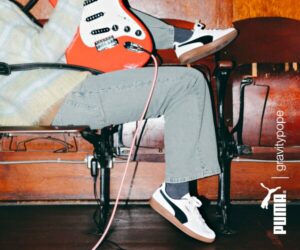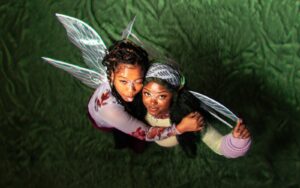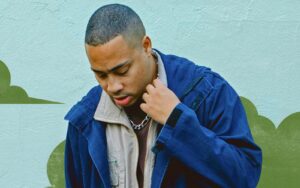Witch Prophet Conjures the Healing Powers of Sound
When her health was called into question by a chronic illness, Ayo Leilani processed her experiences through her music.
by Daniel McIntosh
Photo by Francesca Nocera
- Published on
Ayo Leilani’s music has always been embodied in experience. Under her alias, Witch Prophet, she uses a silky fusion of jazz, R&B, and hip-hop to assert manifestos about her roots, her family, or her life in general. Witch Prophet’s Polaris Prize-shortlisted album, 2020’s DNA Activation, leaned on Leilani’s lived experience as a queer, East African, with song titles drawn from pivotal family members in her life. In the case of her latest album, Gateway Experience, she puts her health under the microscope, documenting her experience with epilepsy and all the side effects that come with it.
RANGE caught up with Leilani while she was in the middle of renovating her pastoral Caledon, Ontario home. The wide open space, perfect for her musical family (her partner is a producer and musician as well), is a far cry from the social atmosphere of her hometown of Toronto. When the renos are done, she plans to open up a recording studio and use the extra space for an artist residency—maybe even raise a few animals in the yard.
“It’s still being renovated so that we can offer this space up to other people from the city, and across Canada, and across the world who just want a space where there’s nature and where it’s quiet, you know, so people like that for writing and for music,” she says.
But perhaps that pales in comparison to the simple act of walking out your front door and being greeted with myriad options as she would in downtown Toronto. Now she has no choice but to drive to get a simple chocolate bar, which is only complicated by the fact that she doesn’t have a licence, a situation that’s been laid out for her by virtue of her medical condition — seizure episodes that result in lucid dreaming, irregular sleep, and are the foundational experiences behind her new album.
Leilani has been having seizures since childhood, but it wasn’t until 2013 when her reaction to them got so bad that she knew something was truly wrong. “When people think of seizures, the first thing they think of is losing consciousness, falling down, shaking. That’s not the type of seizure that I have at all,” she says. “Mine is a focal aware seizure. I am 100 per cent aware of what is happening and I won’t lose consciousness.”
It’s a pyrrhic victory, as they result in bouts of vomiting, fatigue, and exhaustion, not to mention slurred speech and other symptoms. When she searched Google for information, she found a community of people with epilepsy, and people suffering from temporal lobe seizures.
“I used to love having deja vu, but now it puts a lot of fear into me because I can’t control my reaction to it. It can happen at any moment. It terrifies me. It’s not something that I want,” she says. “I’ve had a lot of different appointments with neurological doctors, and it’s been a lot of heavily advocating for myself and being dismissed.”
Not finding much in the way of support from the medical field, Leilani instead channelled her crusade into her music. “It really connected with me and my wonderment around seizures and my brain, and trying to figure out what was happening that way, and wondering if sound and music in a way could help me heal,” she says. The result is boiled into Gateway Experience, an exploration of Leilani’s inner workings through song, and searching for the answer to why.
The result is an album that projects fear, anxiety, and confusion onto the listener. “I’m Scared,” a ballad midway through the album, relays the fear with only a reverberated piano and Leilani’s chilling, silvery vocals. She questions the nature of the illness, solemnly singing, “Is this destiny, For all time to be, Where do I go, When I close my eyes.” The album also contains fragmentary visions of the forms Leilani would witness.
While the first single from Gateway Experience may be titled “Energy Vampire,” the creatures that she references on the track are far from the fanged creatures of lore. Inspired by beings Leilani sees in her lucid dreams, which often precede her seizures, they’re as tall as redwood trees, as dark as shadows, and they don’t walk, they glide. At first, she wondered whether her experience would be too dense to synthesize into a song, but energy vampires exist in our corporeal world as well.
“An energy vampire is any type of person or being that sucks your energy,” says Leilani. “You don’t necessarily need to break it down for people.”
Throughout the album, SUN SUN’s production shines, providing ample space for Leilani’s lilting voice to float, whether it’s over a classic boom-bap beat as on “Bird’s Eye View,” or on “Fire,” a song that’s drill-by-way-of-flamenco.
In all, Gateway Experience reflects Leilani’s experience with a disease that causes her to turn inward, away from a destructive medical system that readily dismisses people who fall outside of normative standards—especially queer, Black people. “I have to be my own advocate within the medical industry because Black people, women or not, and queer people are not taken seriously and are not listened to when it comes to our health,” she says.
In creating her latest project, she becomes something of a scientist herself, probing the concept that the brain is more powerful than we know. Her discoveries reveal that it’s worth it just to shine a spotlight on an under-researched and under-acknowledged form of seizures, demystifying their entire existence through sound.
“This is my diagnosis,” she says. “I have to do this, or I’m going to regret it for all my lifetime.”
By Johnny Papan
Seattle’s alt-rock superheroes summon new and old habits on Dark Matter.
By Sebastian Buzzalino
The Francophone post-punk trio bite the proverbial apple and turn up the volume on their new EP, Serpent Échelle.




















